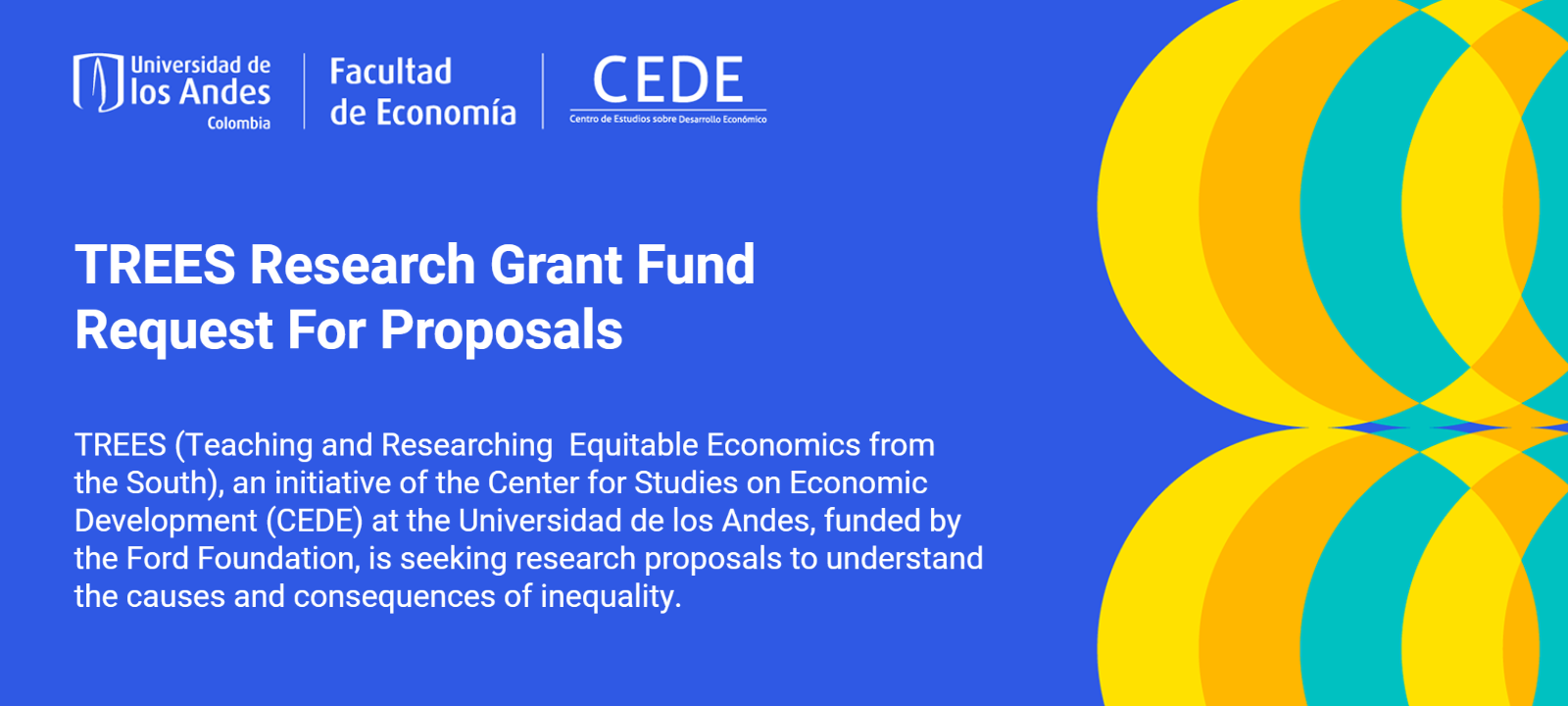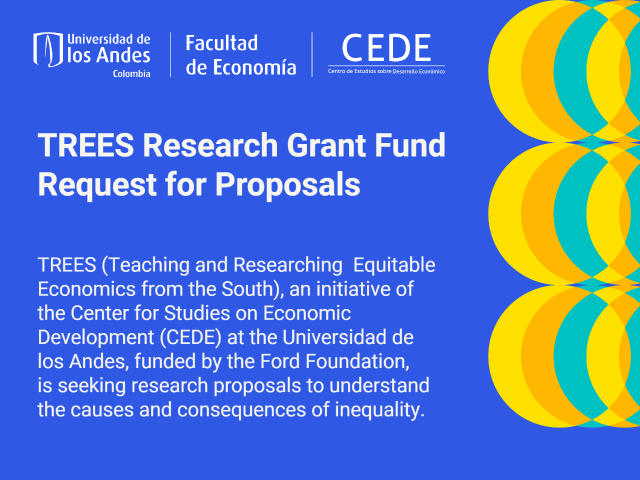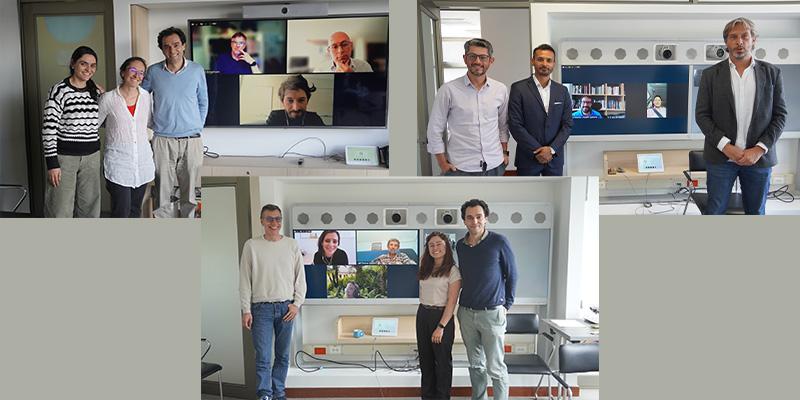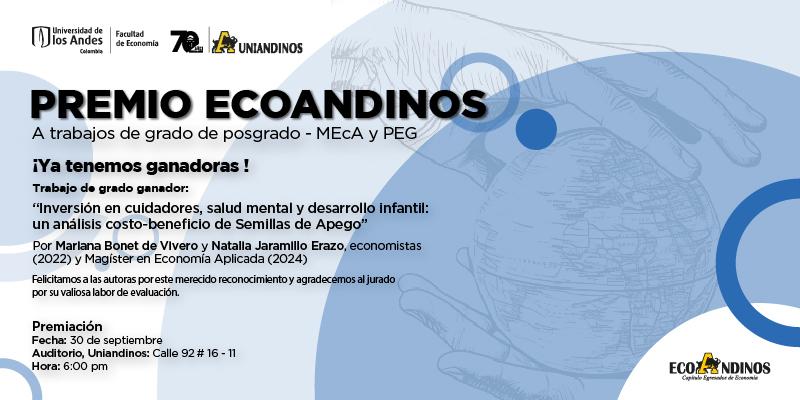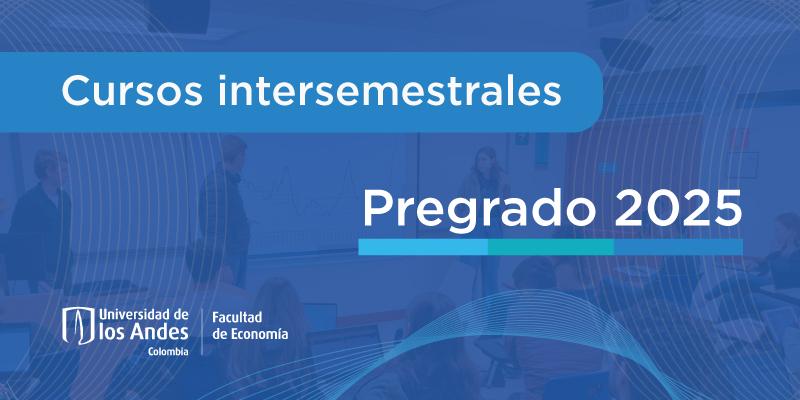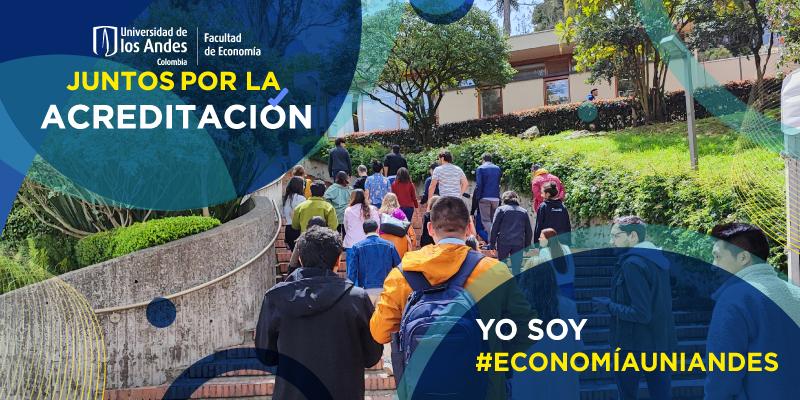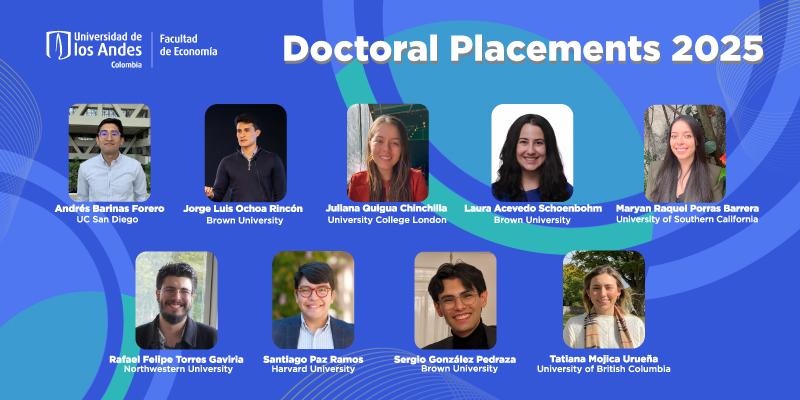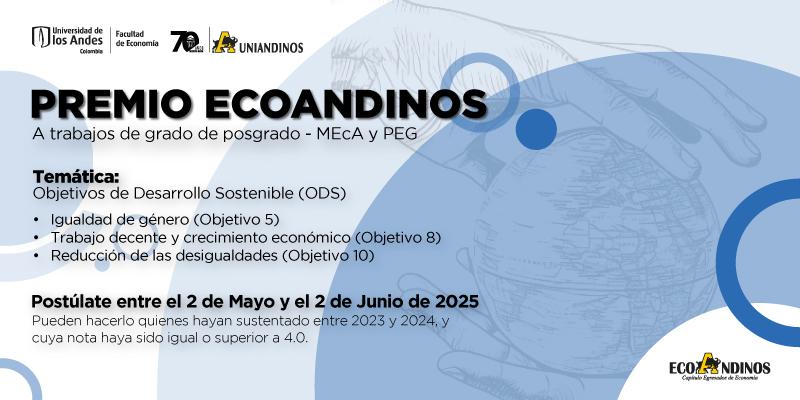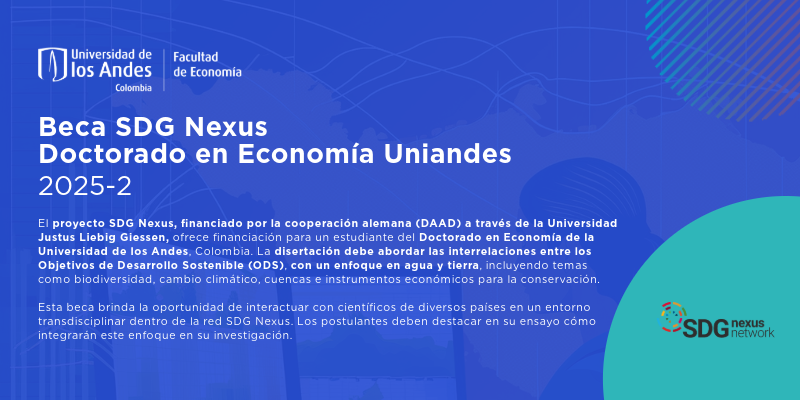TREES (Teaching and Researching Equitable Economics from the South), an initiative of the Center for Studies on Economic Development (CEDE) at the Universidad de los Andes, funded by the Ford Foundation, is seeking research proposals to understand the causes and consequences of inequality.
Nine projects, led by Principal Investigators based in Latin America and the Caribbean, will receive the support of up to COP 60,000,000 each.
This initiative is particularly interested in research proposals incorporating innovative approaches, encouraging dialogue, and facilitating joint knowledge-building between economics and other disciplines. TREES seeks proposals considering the specificities of inequality in the Global South and whose impact goes beyond this specific support, for instance, through initiating a research agenda or establishing new collaborations of greater scope. Candidates with different skills and training backgrounds willing to work on highly innovative research projects are welcome.
TREES will give special consideration to conceptually and methodologically disruptive proposals and contribute to rethinking how we research, educate, and disseminate the economics of inequality.
The initiative will give priority to research contemplating non-strictly economic aspects of inequality. TREES welcomes empirical studies and contributions to the measurement, conceptualization, and historicization of inequality.
TREES encourages rigorous and intellectually ambitious research on the most pressing inequality questions. TREES seeks research with a lasting impact addressing societal needs or challenges. TREES welcomes proposals from multiple disciplinary and methodological perspectives, both domestically and internationally.
Proposal Guidelines
Interested applicants should fill out and submit the following documents:
1) Research Proposal*: You´ll be expected to include:
- Project title.
- Project summary.
- Motivation and objectives: Statement of the research question and description of how it contributes to the objectives of the call.
- Methodology.
- Expected outputs and how they are expected to impact a wider public or beyond the academy.
- Co-funding sources: If co-funding sources still need to be identified or confirmed, evaluate the possibility of accessing these sources.
- Capacities that you hope to create and strengthen.
- Project Timeline: this should indicate the proposed start and end dates of the project as well as key project events and milestones. The significant activities listed in the project timeline should be reflected in the proposal narrative.
i) References, at most three pages.
*The research proposal (items a-h) may not exceed 7 pages with line spacing equal to or greater than 1.5 and font size equal to or greater than 11p.
2) Budget and Budget Justification: Include each budget item with a brief description and justification. The budget must be proposed in Colombian Pesos (COP). No indirect costs or bonuses for Principal Investigators will be funded. This section may not exceed 1 page with line spacing equal to or greater than 1.5 and font size equal to or greater than 11p.
3) Project Team: Describe the project team and identify the roles, responsibilities, and knowledge base of the Principal Investigator (PI), Co-PI(s), and any supporting researcher(s). If your project includes Co-PIs and other supporting researchers, articulate how the team will work together to complete the research project. Include a current Resume of the PI and Co-PI(s). This section may not exceed 1 page with line spacing equal to or greater than 1.5 and font size equal to or greater than 11p, excluding Resumes.
Eligibility
The PI must be affiliated with a non-profit organization or public/governmental institution willing to serve as the administering organization if the grant is awarded. The host institution must be legally based in Latin America or the Caribbean.
Submission Guidelines
Full proposals for the TREES Research Grant Fund must be submitted by June 18, 2023, at 11:59 PM Bogota time (UTC-5). You will be notified that your submission has been received within one week of submission.
Full Proposal documents must be submitted to: [email protected]
TREES Initiative contact for any questions or suggestions:
Silvia Mongelós
Program Manager – TREES Initiative [email protected]
Note: To encourage dialogue between investigators from Latin America and the Caribbean, this call, the documents to be delivered, the deliverables, and the associated events, will be in English.
Note: Grants are awarded to the Host Institution with the explicit commitment that this institution offers appropriate conditions for the Principal Investigator and their team independently to direct the research and manage its funding for the duration of the project. TREES Research Grant Fund cannot be awarded directly to individuals.
Commitments:
The successful candidate is expected to:
1) Comply with the guidelines on lobbying prohibition and the guidelines on prohibition on political campaign intervention detailed in Annex 1.
2) Proof of Institutional Review Board (IRB) approval is not required at the time of proposal submission. If IRB approval is needed for this project and it is chosen for funding, the awarded candidate will be responsible for obtaining IRB review and approval.
3) Complete proposed projects and their financial execution, including the delivery of their final reports and final products, no later than October 15, 2024.
4) Participate in a TREES meeting that will take place during the second quarter of 2024. The logistical and methodological details will be shared later.
5) Comply with deliverables subject to disbursements in accordance with the following schedule:
Deliverables and disbursements
|
|
|
· Formalization of grant award. | August 2023 | 40% of the approved |
· Progress Report. Technical report with progress on the proposed project. · A financial accounting report, in COP, which includes a statement by the responsible financial officer of your organization certifying the accuracy of the report. This report must cover the expenses of 40% of the budget. |
March 2024 |
|
· Final report and outputs. · A financial accounting report, in COP, which includes a statement by the responsible financial officer of your organization certifying the accuracy of the report. This report must cover the expenses of 100% of the budget.
|
October,2024 |
10% of the approved budget
|
ANNEX 1
Direct Lobbying is any attempt to influence legislation through communication that:
- Refers to specific legislation;
- Reflects a view on the legislation; and
- Is to any member or employee of a legislative body or any government official or employee who may participate in the formulation of the legislation.
Grassroots Lobbying is any attempt to influence legislation through communication with the public that:
- Refers to specific legislation;
- Reflects a view on the legislation; and
- Encourages the recipient with a “call to action” regarding the legislation (e.g., to contact a legislator by phone, email, sign a petition, etc.)
What is specific legislation?
Legislation is any action by any legislative body in the U.S. or overseas (e.g., the U.S. Congress, a national parliament, a state legislature, a local city council, etc.), including:
- Specific legislative proposals (including those not yet introduced or pending in the body)
- Authorizing and budget appropriations legislation
- Legislative confirmation of executive appointees
- Legislative resolutions, even if they have no binding effect
- Treaties subject to legislative approval
- A ballot initiative or referendum by the public (where the voters = legislative body)
- U.N. resolutions that have binding effect on member states
- Model legislation
What is not specific legislation?
The legislation does not include:
- administrative rules or regulations enacted by a government agency or ministry
- executive orders and other actions solely within executive power
- judicial decisions
- budget allocation decisions that do not require legislative approval
What does not qualify as lobbying?
There are some exceptions that allow foundation funds to be used for communications that would otherwise be considered lobbying:
1. Technical advice or assistance provided to a governmental body, committee, or subcommittee in response to a written request, if
- the request is on behalf of the body (as opposed to an individual legislator); and
- the response is made available to all members of the body on a nonpartisan basis, such as at a committee or subcommittee hearing.
2. Nonpartisan analysis, study, or research such as a white paper, report, or panel discussion, if
- it contains a sufficiently full and fair exposition of an issue that would allow someone to form an independent opinion or conclusion; and
- is distributed broadly (including those on both sides of the issue).
What are some examples?
Some examples of prohibited lobbying include:
- drafting, negotiating, or providing comments or other technical assistance on a pending bill
- meeting with legislative staff members to ask them to increase funding for a program that requires a legislative budget appropriation
- asking the organization’s members to write to their legislators to confirm a judicial appointee
- asking the public to vote a particular way on a ballot initiative
Some examples of permissible advocacy include:
- Monitoring the progress of pending legislation and sharing the results of the organization’s
- Website
- Providing testimony at a congressional hearing in response to a letter from the committee
- Expressing a view on a bill in an op-ed article that does not ask the public to take any action
- Educating legislators on a particular issue without addressing specific legislation
- Meeting with staff of a governmental agency to advocate for specific implementing regulations under an existing law
- Filing a lawsuit to overturn a law
What are the key elements of prohibited political campaign intervention?
A candidate: Someone who offers himself or herself, or is proposed by others, as a contestant for elective public office at the national, state, or local level in any country.
Intervention includes:
- Endorsing or opposing a candidate, verbally or in writing
- Rating a candidate’s fitness for office
- Contributing to a candidate’s campaign
- Publicizing a candidate’s endorsement of the organization’s position
- Issuing statements critical or approving of a public official’s actions when that public official is also a candidate
- Taking any other action that has the effect of promoting or opposing a candidate Intervention in support or opposition of a political party is also considered to be prohibited campaign intervention.
What kind of political activity is permitted?
1. Nonpartisan voter education is designed to educate the public and does not show a bias for or against a particular candidate or political party.
2. Speaking engagements where a candidate is invited to speak in a capacity other than as a candidate, as long as:
- The invitation and publicity for the event, and the speech itself, do not promote the candidacy; and
- There is no fundraising for the candidate.
- (This should be used only in very limited circumstances because, as a practical matter, it is very difficult to avoid the appearance of endorsing the speaker’s candidacy.)
3. Candidate forums, as long as:
- All candidates seeking the same office are offered an equal opportunity to speak;
- The organization does not indicate support of or opposition to a candidate;
- The questions are unbiased and discuss a broad array of topics of interest to the public;
- The candidates are not asked to agree or disagree with positions taken by the organization;
- The moderator plays a neutral role and does not suggest approval or disapproval of candidates; and
- The moderator expressly states that the forum is not an endorsement of any candidate and all views expressed are those of particular candidates and not the organization.
4. Candidate education, in the form of programs designed to educate candidates about particular issues, as long as they:
- Do not include strategy advice;
- Are available to all candidates; and
- Are nonpartisan (do not favor or disfavor any political party).
5. Political activities of staff and board members in their individual capacities, including when staff and board members themselves run for office, as long as they:
- Do not use the organization’s financial resources, facilities, equipment, or personnel (e.g., do
- not use work email or conduct the activity during work hours);
- Make clear that actions taken or statements made are theirs and not the organization’s; and
- Create separate social media accounts for personal political and lobbying activity instead of using accounts that are also used for their work for the organization.
What about issue advocacy?
It is permissible to advocate on issues in an election year, but care must be taken to avoid linking issue advocacy to an election or a candidate. Here are some guidelines:
- Do not promote candidates who agree with the organization’s views on a particular issue.
- Do not distribute candidate scorecards or seek candidate pledges on specific issues.
- Do not provide messaging or polling information to political parties on specific issues.
- Be cautious of distributing issue-oriented materials just before an election--make sure the materials are completely nonpartisan and do not preference a candidate or group of candidates.
- Avoid urging people to vote based on a particular issue where the issue clearly divides the candidates or parties.
What about voter registration and get-out-the-vote activities?
There are many technical rules that apply to voter registration and get-out-the-vote activities. You may not use Ford Foundation grant funds for such activities unless specifically approved as part of your grant activities in the proposal. Please consult your legal counsel.
